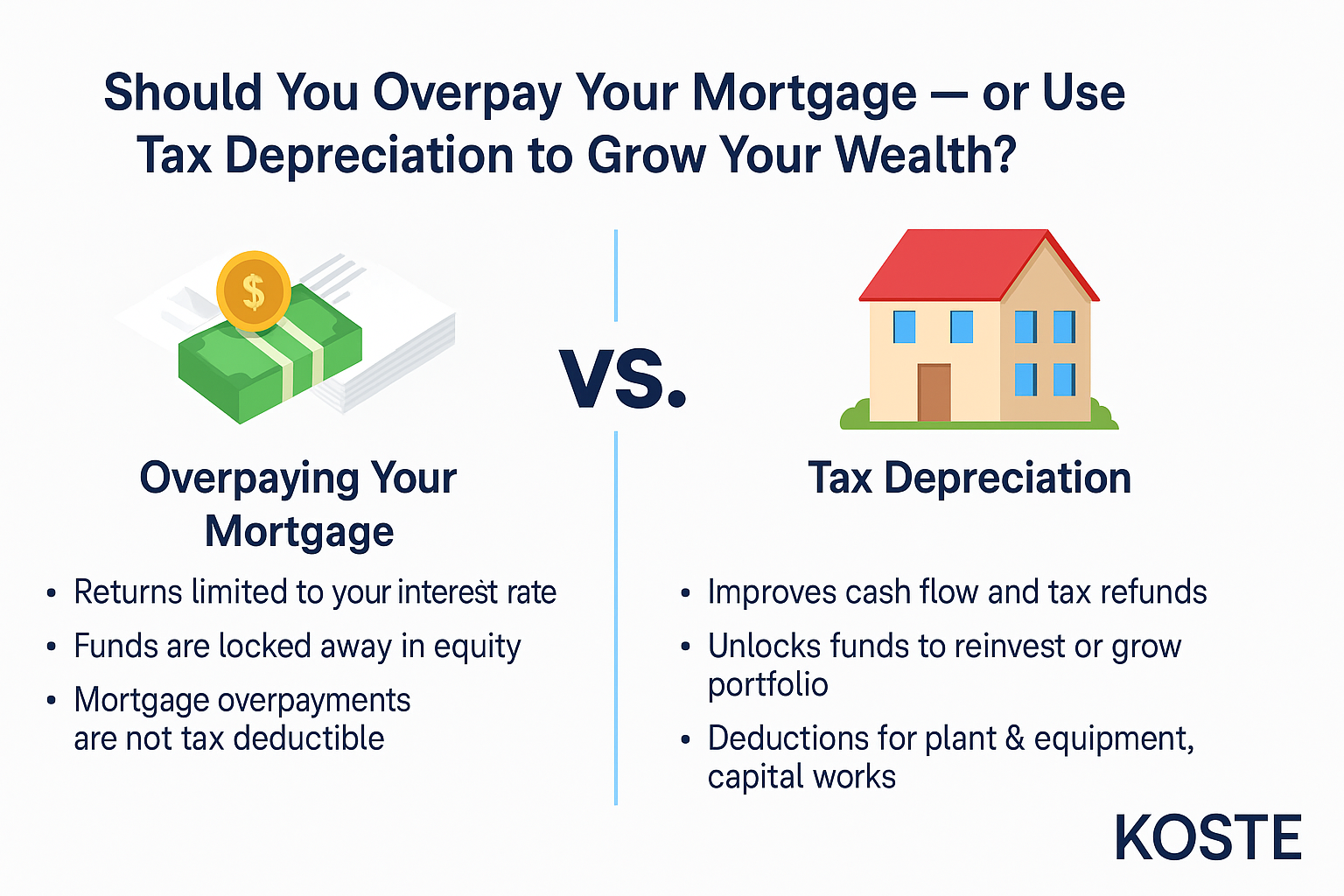
How Small Businesses Can Save On Tax!
With many businesses feeling the pressure of supply costs and inflationary pressures, reducing taxes can help with cash flow significantly.
Here at Koste, we specialise in helping thousands ofbusinessess prepare and manage Tax Depreciations schedules. This process involves spreading the cost of an asset over its useful life, allowing a business to claim a portion of the cost as a tax deduction each year. Utilizing tax depreciation can help a small business save tax by reducing its overall tax burden in the short term.
To take advantage of tax depreciation, a small business must purchase assets that qualify for depreciation, such as machinery, equipment, and buildings. The business can then claim a portion of the cost of these assets as a tax deduction each year, based on the depreciation schedule set by the government.
To claim tax depreciation, a small business must keep accurate records of its assets and their purchase costs. It is also important for the business to understand which assets qualify for depreciation and the applicable depreciation rates. A small business may also be able to claim the instant asset write-off and temporary full expensing tax measures, explained in our detailed blog.
The instant asset write-off allows small businesses with an annual turnover of less than $10 million to claim an immediate tax deduction for the cost of new or second-hand assets that are used or installed ready for use by the business. The asset must be purchased and used for business purposes, and the business must own it at the end of the income year.
The temporary full expensing tax measure allows small businesses to claim a full tax deduction for the cost of new depreciable assets in the year they are first used or installed and ready for use. This measure is only available for a limited time and applies to assets that are purchased and used or installed ready for use between 7:30 p.m. on October 6, 2020, and June 30, 2022.
To claim the instant asset write-off or temporary full expensing, a small business must meet the eligibility criteria and keep accurate records of the assets purchased and their costs. It is important for small businesses to seek advice from a financial professional to determine whether they are eligible for these tax measures and how to take advantage of them.
As well as taking advantage of depreciation deductions through the process of spreading the cost of an asset over its useful life. reduce the business’s tax burden in the short term.
Other ways a small business may save tax include:
- Claiming the small business tax offset: This is a tax discount available to small businesses with an annual turnover of less than $10 million.
- Using a superannuation clearing house: This allows small businesses to make super contributions for their employees through a single portal, reducing administrative costs and potential tax liabilities.
- Utilizing the research and development tax incentive: This program allows businesses to claim tax offsets for eligible research and development activities.
- Claiming deductions for business expenses: Small businesses can claim deductions for expenses that are directly related to the business, such as advertising and marketing costs, insurance, and rent.
- Setting up a trust: Trusts can be a tax-effective way to distribute income and assets to family members, allowing a business to potentially reduce its tax burden.
- Considering tax-free investments: Some investments, such as employee share schemes and venture capital investments, may be tax-free or have reduced tax rates.
1.Small Business Tax Offset
The small business tax offset is a tax discount available to small businesses with an annual turnover of less than $10 million. It is designed to provide relief to small businesses by reducing the amount of tax they need to pay.
The small business tax offset is calculated as a percentage of the tax a business pays, and the percentage increases as the business’s annual turnover increases. For businesses with an annual turnover of less than $5 million, the tax offset is 8%, increasing to 16% for businesses with an annual turnover between $5 million and $10 million.
To be eligible for the small business tax offset, a business must be a small business entity, which is defined as a business with an annual turnover of less than $10 million or a business that is carried on by an individual, a partnership, or a trust.
The small business tax offset is available to both incorporated and unincorporated businesses. It is generally claimed on the business’s tax return, and it can be used to offset the tax that is payable on the business’s net income.
2. Utilising a Superannuation Clearing House
utilising a superannuation clearing house can help small businesses save tax in a number of ways:
- Reduced administrative costs: A superannuation clearing house allows small businesses to make super contributions for their employees through a single portal rather than individually through multiple super funds. This can save the business time and money on administrative costs.
- Simplified reporting: A clearing house can also simplify the reporting process for small businesses. Rather than having to report to multiple super funds, the business only needs to report to the clearing house, which then distributes the contributions to the relevant funds.
- Reduced potential tax liabilities: Small businesses can also potentially reduce their tax liabilities by using a clearing house. Contributions made through a clearing house are tax-deductible, which means the business can claim a tax deduction for the amount contributed. This can help reduce the business’s overall tax burden.
Overall, using a superannuation clearing house can help small businesses save time and money on administrative tasks and potentially reduce their tax liabilities.
3. Utilise research and development tax incentives.
Utilising the research and development (R&D) tax incentive can help a business save taxes by allowing it to claim tax offsets for eligible R&D activities. This can help reduce the overall tax burden of the business and allow it to reinvest more of its profits back into the business.
The R&D tax incentive is a government program that provides tax benefits to businesses that undertake R&D activities that aim to create new or improved products, processes, or services. Eligible businesses can claim a tax offset equal to either 43.5% or 38.5% of their eligible R&D expenditure, depending on their size. This tax offset can be claimed in addition to the deductions that businesses can claim for the cost of their R&D activities.
Utilizing the R&D tax incentive can also help businesses attract and retain skilled employees, as it allows them to invest more in R&D and potentially offer more competitive salaries and benefits.
Overall, utilizing the R&D tax incentive can help businesses reduce their tax burden and support the growth and development of their businesses.
4. Claim for small business expenses.
Small businesses can claim deductions for a variety of expenses that are directly related to the business. Some common examples include:
- Advertising and marketing costs: These can include expenses for advertising in print, online, or on television, as well as costs for marketing materials such as brochures or business cards.
- Insurance: Small businesses can claim deductions for insurance premiums that are related to the business, such as public liability insurance, professional indemnity insurance, and business interruption insurance.
- Rent: If a small business rents a physical location or equipment, it can claim deductions for the cost of rent.
- Wages and salaries: Businesses can claim deductions for the wages and salaries they pay to employees.
- Travel expenses: Small businesses can claim deductions for travel expenses related to the business, such as airfares, accommodations, and meals.
- Legal and professional fees: Businesses can claim deductions for legal and professional fees, such as the cost of hiring a lawyer or accountant.
- Office supplies: Businesses can claim deductions for the cost of office supplies, such as paper, pens, and ink.
5. Setting up a trust
Setting up a trust can be a tax-effective way for a small business to distribute income and assets to family members, as it can potentially allow the business to reduce its tax burden. However, it is important for small businesses to carefully consider whether setting up a trust is the best option for their specific circumstances and to seek professional advice before making a decision.
There are several different types of trusts that a small business can set up, each with its own set of tax implications. For example, a family trust can be used to distribute income and assets to family members in a tax-effective way, while a discretionary trust allows the trustee to decide who will receive the trust’s income and assets.
Setting up a trust can also have other benefits for a small business, such as protecting assets and providing flexibility in terms of succession planning. However, it is important to consider the potential costs and risks associated with setting up a trust, such as legal and accounting fees and the potential loss of control over the trust’s assets.
6. Utilise tax-free investments.
Whether a small business should utilize tax-free investments to save on tax will depend on the specific circumstances of the business. Some tax-free investments may be suitable for small businesses, while others may not be.
Some tax-free investments that small businesses may consider include:
- Employee share schemes: These allow small businesses to issue shares or options to their employees at a discounted price. If certain conditions are met, the employees may be eligible for tax concessions on the shares or options they receive.
- Venture capital investments: These are investments in start-up or early-stage businesses that are considered to have high-growth potential. In some cases, venture capital investments may be tax-free or have reduced tax rates.
- Tax-free savings accounts: These are savings accounts that allow individuals to earn tax-free interest or dividends on their investments. Small business owners may consider using these accounts to save for retirement or other long-term goals.
However, it is important for small businesses to carefully consider the risks and potential returns of any investment before deciding whether it is suitable for their business. It is also advisable to seek advice from a financial professional to determine which investments are best suited to the business’s specific circumstances and goals.
Overall, it is important for small businesses to carefully consider the potential benefits and drawbacks of setting up a trust and to seek professional advice before making a decision.
Maximise property tax depreciation
Get a Free Quote today
Koste are the leading providers of commercial Tax Depreciation reports. Whether you are a tenant completing a fit-out or landlord recently purchasing a property we can help.

